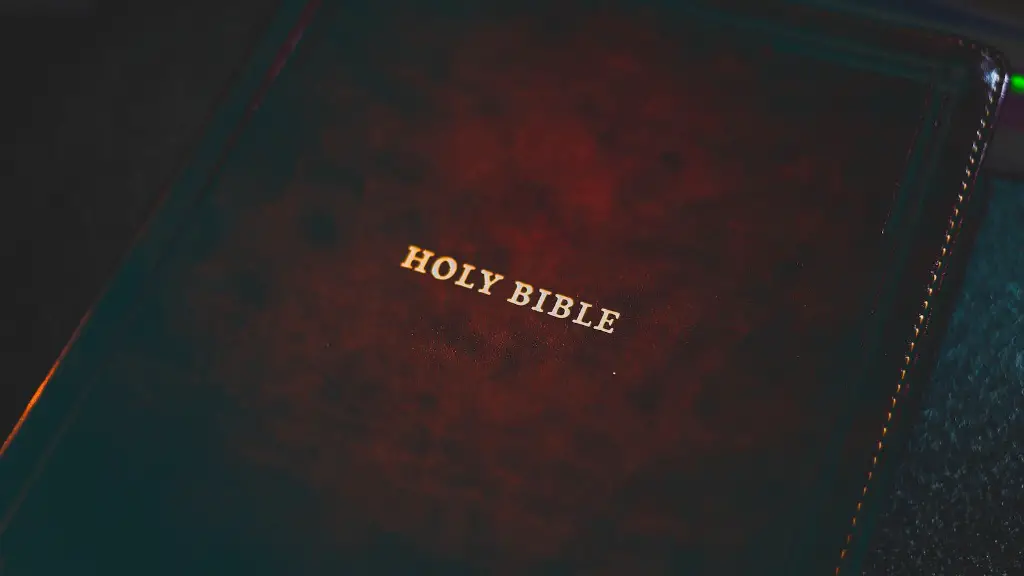Beelzebub in the Bible
Beelzebub, also known as Baal-zevuv and Beelzebul is a name derived from an ancient Semitic god. The Bible refers to Beelzebub as the ‘prince of demons’, and he is often associated with Satan or Lucifer. Though very little is known about the background of Beelzebub or the significance of his role in the Bible, he is considered a powerful and dangerous figure in Christianity and other religions.
In Luke 11:15-18, Jesus speaks of Beelzebub when casting out a demon. In this passage, Jesus implies that Beelzebub is the ruler over all other demons, claiming the devil is incapable of expelling demons without permission from the authority of Beelzebub.
Throughout the New Testament, Beelzebub is referred to as ‘the prince of the devils’ and ‘the chief of the whole order of demons’. These references are thought to demonstrate Beelzebub as an ‘arch-demon’; a powerful figure who is superior to other demons.
Another significant reference to Beelzebub is made in Matthew chapter twelve when Jesus’s opponents seek to discredit him, they claim that Jesus is not performing miracles through the power of the Spirit, but through the aid of Beelzebub.
In the Middle Ages Beelzebub became a subject of worship in witchcraft, myths and superstition. Writers such as Milton and Dante elaborated on his dark character and presence. As early as the 15th century Beelzebub was depicted as a giant fly in an act of association with the sins of gluttony and filth.
In modern theology, Beelzebub is thought to have been a representation of evil and of a Satanic figure in scripture. Yet, despite the popular view of him in demonology, Beelzebub is barely mentioned in the bible and appears to be represented in a more complex and nuanced light than often assumed.
Context & Significance of Beelzebub as a Demon
The origin of the name ‘Beelzebub’ lies in ancient Semitic religion and though traditionally translated as ‘lord of the flies’, it is thought to have been derived from the phrase ‘Baal-zebel’, meaning ‘lord of the dwelling’. This particular siding of Beelzebub is thought to refer to a pagan god of fortification and protection; this vastly differs from the image of Beelzebub often depicted in both literature and Christian theology of today.
This discrepancy has caused theologians over the centuries to draw on a range of interpretations which assign different levels of evil and darkness to Beelzebub. For many, there is a conflict between understanding the prominence of Beelzebub’s presence in the Bible, yet also coming to terms with his perceived lack of severe evil behaviour as well as limited or even possible positive implications of Beelzebub in certain contexts.
The role of Beelzebub in the bible is to an extent reflective of the culture and personalities which created the texts, as well as the social and religious movements which influenced the account’s interpretations. Here, Beelzebub is a representation of a powerful satanic figure, however the subtle implications which are thought to be present in some references make it difficult to fully draw on the true extent of Beelzebub in the bible.
This lack of information suggests that Beelzebub is a vague entity in the biblical landscape. In respects to understanding the narrative, Beelzebub can be seen as a figure used to impart a message of evil and darkness in scripture, however the influence and significance of whose exact representation remains largely unknown.
Beelzebub & Witchcraft
As the centuries progressed and demonology developed, Beelzebub became a figure of worship in acts of witchcraft and other cult-driven activities. Here Beelzebub developed a dark yet complex character, one which was often described as a giant, monstrous fly by authors such as Dante and Milton.
In many rituals and practices, Beelzebub was observed as an object of worship and his appearance was believed to be symbolic of gluttony and filth. Here Beelzebub and his symbolism become a device to criticise the sins of human nature and act as a warning to those who turn away from the Lord.
In some aspects further still, Beelzebub was seen as a trickster figure who chooses sides and favours different people. In these contexts, Beelzebub is thought to at times work with God, an understanding which consistently tests the boundaries of traditional demonology and religious beliefs.
Despite the prominence of Beelzebub amongst forms of evil worship in history, his influence and influence and position in the Bible is thought to have ended by the 5th century; this is thought to have been contributed by the cultural, social and political changes which occurred in between the creation of the Bible and the modern interpretation of it.
The Role & Significance of Beelzebub in Modern Theology
Today Beelzebub)is famed as an arch-demon and one of the most fundamentally evil figures in the Christian tradition; a representation whose spectral countenance calls to mind Satanic forces and the darkest sides of human nature.
This particular impression of Beelzebub, is thought to be the result of building and transforming the characters stories and symbolism throughout the centuries. Beelzebub grew to become an image of hell itself, with references such as Milton’s Paradise Lost portraying him as a defeated devil, who has been sent by God to oversee other demons.
In modern theology however, Beelzebub’s true force is thought to remain hidden in the Bible, with contradictory implications in texts suggesting a greater complexity and ambiguity to his figure and role. Rather than the image of an evil and powerful overlord, some theologians suggest Beelzebub could be an intermediary figure withlimited authority in the spiritual realm; an idea which further blurs the lines between good and evil and raises difficult questions about the biblical context.
Interpretations & Beliefs About Beelzebub
The understanding and interpretation of Beelzebub continues to cause disagreements and debates amongst theologians. The vagueness of Beelzebub and his lack of presence in the Bible causes some confusion, yet also opens up the potential of diverse speculative narratives.
What remains firm is the cultural understanding of Beelzebub as a powerful symbol of evil and representation of Satan. Here Beelzebub serves a purpose in the Bible which goes beyond the bounds of his individual countenance, by acting as a reminder of the destructive power of sin and of the ever present danger of hell. This is also seen in his depiction in forms of witchcraft and worship, whereby Beelzebub’s representation becomes both an instruction and warning sign against the sins of mankind.
Beelzebub’s presence in the Bible also seems to highlight the significance of certain figures in the world of demons, displaying a hierarchy and a prevalence of pride and power in the spiritual realm.
Despite the disagreement surrounding Beelzebub’s exact figure and position in Christian scripture, one is left with a forbidding yet enigmatic idea of an ancient and powerful demonic figure; a representation whose real influence and significance in the Bible remain ambiguous and unresolved.
Influence & Impact of Beelzebub
The influence of Beelzebub is far-reaching, from literature to popular culture and to spiritual meaning and symbolism. Here Beelzebub is associated with an array of emotions as well as a spectrum of varying cultural implications.
In modern popular culture, Beelzebub is often featured in movies, television shows and video games, where his name and character are used to represent fear and danger. This is particularly prominent in the horror genre, which often seeks to explore and translate the mysterious and sinister nature of Beelzebub.
In literature, Beelzebub is a significant figure in writers such as Milton and Dante, whereby he becomes a representation of the fallen nature of man. This particular use of Beelzebub raises the already present themes of good and evil and recalls to mind momentousness and power of Revelation.
The role of Beelzebub within the Christian tradition is also prominent, with many denominations invoking his name alongside the traditional Lord’s Prayer. This denotes a certain respect and reverence in which Beelzebub is held, despite his obvious malevolent connotations.
Overall, the influence of Beelzebub is both vast and varied, yet the context and significance of his presence remain largely mysterious and contested.
Modern Conclusions & Analysis
Beelzebub has been a source of fascination and consternation for centuries, and yet his exact role in the Bible remains murky and almost elusive. Beelzebub’s representations throughout literature and popular culture suggest a pandemic presence and decisive figure, yet his own presence in the Bible suggests a slightly more nuanced entity, with possible positive implications in certain contexts.
The deceptive nature of Beelzebub’s role in scripture can make it difficult to draw definite conclusions; however, Beelzebub remains a revered and respected figure whose presence both in the Bible and in modern culture canal to mind powerful emotions and philosophical questions.
Overall, Beelzebub is an enigmatic figure whom to this day has yet to find a definitive place in both scripture and popular culture, leaving many theologians and authors in pursuit of a greater understanding of his meaning and subtleties.





